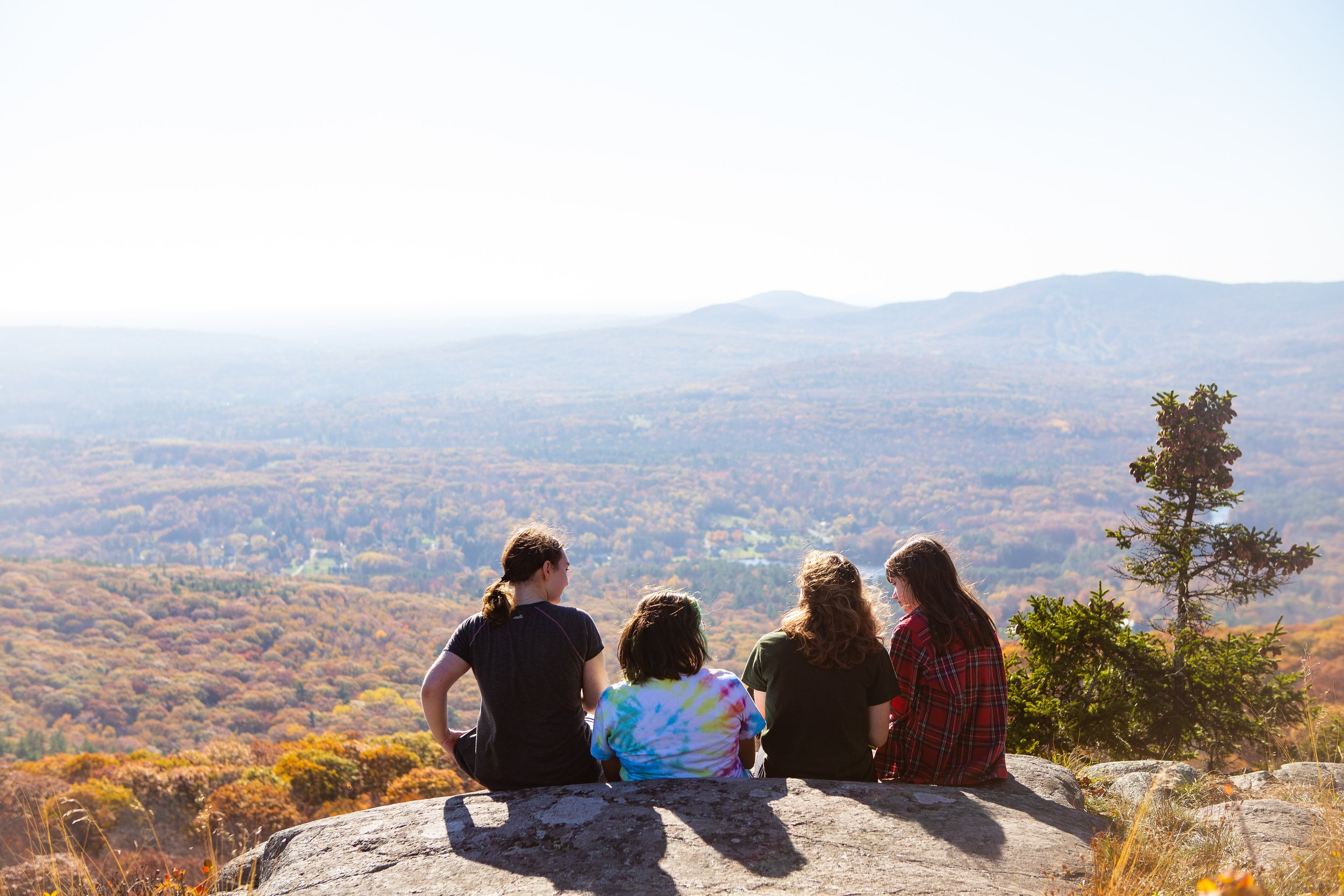
Teen Health & the Outdoors
All teens need time outside.
Research shows that spending time outdoors significantly impacts our short and long-term mental and physical health. Teens to Trails is committed to improving the whole body health of Maine teens by engaging them in fun, inclusive, non-competitive outdoor experiences.
Reduces Anxiety and Improves Mood
According to the 2020-21 National Survey of Children’s Health, Maine has the second highest rate in the nation of children diagnosed with anxiety. One-third (32%) of Maine middle school students and almost half (43%) of Maine high school students also report poor mental health. Time in nature - watching trees sway in the wind, breathing fresh air, and listening to bird calls - positively activates our senses, elevates our moods, and calms our nervous systems. Research shows spending time outside improves individual mental health outcomes later in life.
-
Research consistently shows that spending time in nature reduces stress. Spending time outside lowers stress levels, and reduces symptoms of anxiety and depression. Prioritizing time outdoors can lead to sustained improvements in our mental health. Research has shown time outside even decreases teens' risk of developing mental health disorders.
-
Contact with nature is associated with increases in happiness, positive affect, positive social interactions, and a sense of meaning and purpose in life. Time spent outdoors improves mood and positive emotions among teens, which encourages generous and kind behaviors. Even just looking at nature can increase feelings of tranquility and overall well-being.
-
Spending time outdoors helps teens build emotional resilience, the ability to manage difficult feelings, and navigate stressful situations. This emotional resiliency helps teens recover from adverse experiences, protect their mental health, and improve their overall well-being into adulthood.
Teens to Trails encourages students and teachers to create outdoor clubs for their school communities, so that students have an opportunity to connect in a non-competitive environment outdoors.
When teenagers have an opportunity to explore together outside without a set agenda, they decompress, find ease and gain insight on how time in nature can make them feel stronger — inside and out.
Stronger Social and Environmental Connections
Maine teens are more than twice as likely to feel lonely than older generations. For rural Mainers, loneliness and isolation are exacerbated by a lack of access to social services, which has led to an increase in alcohol and drug use. Many teens - by some estimates 60% - are deeply worried about climate change and their futures. At the same time, teens are spending more time on screens and less time outdoors and with each other. Spending time outdoors creates opportunities for connection and reduces feelings of loneliness and social isolation. A large body of evidence shows that teens who interact with nature tend to become more involved with their community and are less likely to engage in substance abuse.
Outdoor Clubs help teens feel connected to their communities and the natural environment, which builds lifelong habits of wellness and helps guard against substance use disorders and mental health challenges.
-
The majority of teens today across the U.S. are worried about how climate change will impact their futures. Teens who spend time outdoors are more engaged with natural places and are more likely to make environmentally-conscience decisions. Getting teens engaged in the outdoors is a key step in motivating the next generation of climate change leaders.
-
Maine teens are growing up in a cultural moment of narcissism, self-shame, and criticism that's largely fueled by social media. Experiencing awe, the feeling of being in the presence of something so vast or beautiful that it shifts our perspective, helps get us out of our heads and see that we are part of a much bigger whole. In particular, experiencing awe outdoors helps calm our nervous systems, boosts self-esteem, and promotes trust and connection.
Awe often comes from trying something new. Our Outdoor Clubs are inclusive, regardless of ability or experience. All teens are welcomed and encouraged to join a club, embrace their curiosity, appropriately place their natural attraction to risk, and pursue new experiences.
-
Maine middle and high school students who feel like adults and peers in their schools and community care about them are 80% more likely to have support from a caring adult. This feeling of connection to school and community is a strong predictor of teen mental health, allowing students to experience less emotional distress and reducing the likelihood of teen pregnancy and substance use (MRBN, 2020). Spending time with peers in nature helps teens develop a sense of belonging and feel like they are part of a community. Research also shows that the health benefits of spending time outdoors are stronger when schools encourage outdoor play.
When your school registers with Teens to Trails, you’re invited to be a part of our seasonal outdoor programming, trip lotteries and more incredible opportunities to explore outside together.
Students are invited to experience new places and activities, providing opportunities to learn about the nature all around them and experience its inspiring effects on the body and spirit. With that knowledge, many become environmental stewards — caring for the land and the trails they’ve come to know.
We also work to bring school communities together through our annual camping Rendezvous, Winter Skills weekend, and our popular white water rafting weekend with Adventure Bound.
A Sense of Mattering
According to the 2020-21 National Survey of Children’s Health, 49% of Maine high school students and 45% of Maine middle school students believe they do not matter to people in their community. Teens who feel valued by their broader communities tend to have stronger relationships, feel happier, and are less likely to consider suicide or engage in substance abuse.
Teens to Trails helps Maine’s middle and high school students cultivate a sense of mattering by engaging them in positive, group outdoor experiences, such as hiking, biking, canoeing, and beach trips, that are designed to build connection and community.
-
Maine teens are spending less time in person with peers than previous generations, which has contributed to widespread increases in mental health struggles. At the same time, school sports teams have become more competitive, and schools across Maine are seeing a decline in sport participation. A large body of evidence demonstrates that engaging in outdoor activities improves team-building skills, independence, self-perception, and self-esteem among teens.
When we empower our teenagers to try something new, listen to their thoughts and feelings, or give them the experience to be a part of community-wide project, we are letting them know they matter.
Teens to Trails believes that youth mattering is integral to all the work we do — from our Youth Advisory Council to our student interns to offering scholarships so that students can experience an all new outdoor opportunity. It’s all designed to create confident, positive young adults.
Hear from one of our students and find out how a trip buoyed her confidence ten-fold.
Additional Benefits
Research continues to demonstrate the many ways that spending time outdoors significantly benefits teen development and whole-body health.
-
On average, teens across the U.S. are not getting enough sleep, which impacts school performance, mental and physical health, and substance use. Exposure to natural light, even briefly, can improve sleep patterns.
-
Middle and high school students are at a time in their development when they are exploring who they are and who they want to be. Participating in outdoor experiences helps teens develop valuable life skills, including self-management, leadership, cooperation, and compassion for themselves and their community.
-
Maine students’ math and reading test scores have fallen significantly over the past three years as the COVID-19 pandemic disrupted learning. Spending time outdoors, in tandem with in-person learning, can help students recover from the pandemic distractions by supporting cognitive development. Interacting with nature boosts concentration, promotes working memory, and can help improve academic performance. Outdoor play can also increase motivation to learn and achieve.
Once students have an opportunity to explore outdoors together, we hear so many positive things — from having a sense of calm when they’re outside to improved focus for studies and so much more!
To hear from some of these inspiring students, we encourage you to watch this video.




